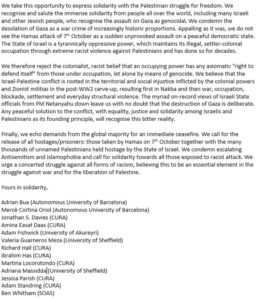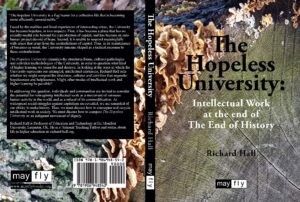This is the text of the talk I have just given at the Symposium, Little Acts of Decolonization. I am very grateful to Juliet Henderson, Bally Kaur, Amrita Narang and Sayan Dey for their support. It erupts from some indignation in The Hopeless University. This symposium has been a gift.
A premise: for whom do we write as the world burns?
Where our writing is supposed to be excellent. Graded as 3* or 4*. Impactful. Entrepreneurial. With a tempo set externally. Regulated externally. Governed and measured externally. And that recalibrates our institutions and disciplines, or the subjects that discipline us. So those subjects and institutions discipline us epistemologically, ontologically and methodologically. To perform in particular ways.
And we might ask whether our being, doing, knowing and writing are simply reproducing, in and through the text, a collective life that is becoming more efficiently unsustainable.
Our knowing, doing, being and writing are shaped inside institutional and disciplinary structures, cultures and practices that are hopeless; hopeless in giving us the freedom to address crises of capitalism. Rather than helping us to imagine or reimagine the creation of a liveable environment for humans and non-human animals, our practices are designed to enable capital to reimagine itself. Moreover, we believe that our knowing, doing, being, and writing are a labour of love, which enable new forms of freedom, self-actualisation, social wealth or public good. Yet, they take place inside spaces of self-exploitation, self-harm, overwork, anxiety, dissonance. And these are amplified by the harassment, marginalisation and discrimination felt by certain bodies; amplified by methodologies that reproduce settler-colonial and racial-patriarchal cultures of silence as another violence.
Some questions: So, we might ask: How do we write, not against what the University and its discipline(s) have become, but beyond the University and its discipline(s)? What would a society look like that no longer needed to write-up the University and its discipline(s), in order to justify those as its intellectual containers? What would intellectual work/practice look like in this society that no longer needed to write for-or-against the University and its discipline(s)? Could we write-down or write-off the debts that are attributed to us, inside the capitalist University?
In this, we might consider what do we need to negate, abolish and transcend inside ourselves, in order to write-up and tell-out our being-beyond the settler-colonial and racial-patriarchal University?
Some values
I am reminded that, in Living a Feminist Life, Sara Ahmed speaks for a being, doing and knowing that might also shape my writing. This is a plural mode (a pluriverse) that:
- does not mean adopting a set of ideals or norms of conduct;
- might mean asking ethical questions about how to live better in an unjust and unequal world (in a not-feminist and antifeminist world);
- asks how to create relationships with others that are more equal;
- asks how to find ways to support those who are not supported or are less supported by social systems; and
- questions how to keep coming up against histories that have become concrete, histories that have become as solid as walls.
The archive
How do we write-up or write-down a new archive? This forces us to consider what has been written-off as invalid or unreliable. It forces us to consider for what kind of archive do we yearn? Achille Mbembe reminds us of the importance of expanding the human archive beyond what is deemed particularly valuable, and making richer, many-sided interconnections within it. Many-sided connections that reflect our humanity beyond the systemic desire to repurpose our lives as valuable, estranged, one-sided; as labour.
And here, the University cannot be transformed through the replacement of the archive of the high-performing, white man, whose privilege is based upon particular logics of intellectual and social reproduction, with that of another, particular, social subject.
Instead can we enact a process of writing-up a new sociability and relationality, which are ontologically and epistemologically plural? Unfolding. Composting what is, grieving what we have lost, imagining what might be.
Writing the Undercommons
And I am reminded that in this 10th anniversary of The Undercommons, Stefano Harney and Fred Moten spoke of acts of cultivation, and of cultivating Black study, possibly as a kind of fugitive planning. Such study is not what the University wants. Particular modes of study are what the university wants us to cultivate.
As Jack Halberstam wrote in the preface to the Undercommons (The Wild beyond: With and for the Undercommons) ‘the projects of “fugitive planning and black study” are mostly about reaching out to find connection; they are about making common cause with the brokenness of being, a brokenness, I would venture to say, that is also blackness, that remains blackness, and will, despite all, remain broken because this book is not a prescription for repair.’
He goes on to note that ‘we cannot be satisfied with the recognition and acknowledgement generated by the very system that denies a) that anything was ever broken and b) that we deserved to be the broken part; so we refuse to ask for recognition and instead we want to take apart, dismantle, tear down the structure that, right now, limits our ability to find each other, to see beyond it and to access the places that we know lie outside its walls.’
We want to write it off. We need to write-up another archive. The archive for which we yearn. An archive that refuses our enforced estrangement from, and competition with, each other.
Writing with-and-for
This is the general antagonism of expression; of writing-down the debts that they demand are repaid through academic work as a measurable, impactful, 4*, excellent labour of love. This general antagonism is not critique, but is study beyond what-is, in order to experiment with what-might-be.
And I remember that Subcommandante Marcos argued that our intellectual work needs to show ‘how the world was born and show where it is to be found’, and in this our yearning is to write-up our stories, and not as those stories form the University’s data-points. Co-opted by the University as objective data points, denying subjectivity, reproducing alienation and hopelessness.
Our with-and-for is not this. No.
We write-up and through our stories to end the world that refuses them. This is study with-and-for each other, and not with-and-for or inside-and-against the University and the discipline. The University and its discipline.
This with-and-for refuses the reality that our disciplines discipline us to write as if we are in a hostile world that needs to be tamed. It refuses a militarized and securitized writing-up of the world. It refuses a foreclosing of who we might be, and of our being and becoming. Our storytelling, dreaming, weaving, each refuse the desire of the institution to foreclose upon us; to reduce us to impactful, entrepreneurial, whatever. Or that we must be, in the words of Harney and Moten, finished, passed, completed.
Written-up as valuable; our insurance against the fear of being amortized as a cost that needs to be written-off.
This is antagonism against what Harney and Moten call the ‘deadening labor for the university, and beyond that, the negligence of professionalization, and the professionalization of the critical academic’.
Instead we might consider how we write to develop a mode of living together; a mode of being together that cannot be shared as a model, or a blueprint, or a utopia, but which shapes and cultivates an instance. An instance that is cultivated by study, in spite of one-sided, academic labour. How do we rupture this so that we can write from the standpoint of no standpoint, of everywhere and nowhere, of never and to come, of thing and no thing?
As The Undercommons closes out, Harney speaks of our ‘beginning with, and acting out, what [we] want’, as ‘a deepening of scale and the potentials of scale.’ He says ‘the further I get to the with and for, the happier I am.’
This is not our writing-down our one-sidedness, as a form of accounting and justifying. It is our writing that off. Writing that off as we write the world otherwise; acknowledging the debts that we have to each other. The many-sidedness of our knowing, being, and doing, as reciprocal debts and gifts.
The reciprocity and mutuality and dignity and telling-out of our souls.
Our ability to breathe in the world.
Our ability to imagine the world otherwise.
A richer archive for us to study, with-and-for.

